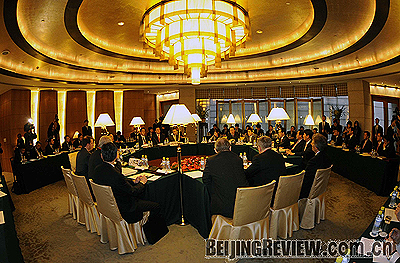|
|

FOCUS ON VERIFICATION: The six-party talks resume in Beijing on December 8 |
The year 2008 has been a dramatic year for the six-party talks addressing North Korea's nuclear issue. Over the past year, the countries involved have experienced desperation, excitement, astonishment and standstill. Before the year ended, however, country representatives were able to fit in one last meeting.
Before the meeting, started on December 8 in Beijing, Chinese Vice Foreign Minister Wu Dawei suggested three areas of focus. Those areas were verification, implementation of the rest of the second-phase action plan and the establishment of a peace and security mechanism in Northeast Asia.
"This meeting is hopeful, but also is of great difficulty," Shi Yongming, an associate researcher at the China Institute of International Studies, told Beijing Review.
North Korea's nuclear disablement process has been contentious. On June 26, North Korea submitted its declaration of nuclear equipment in exchange for its removal from the U.S. Government list of states that sponsor terrorism. But it was not until October 11 that Secretary of State Condoleezza Rice formally signed the document authorizing the removal.
The United States and North Korea have different understandings about verification, which is at the core of current disputes, Shi said. North Korea insists that verification should be the last step of final settlement. But the U.S. side considers initial verification the only way to guarantee denuclearization.
In North Korea's view, it cannot get any more from the Bush administration, but it might from the next U.S. government. Postponing the agreement appeared to be a good idea. However, the current U.S. administration was eager to fulfill its task and achieve denuclearization on the Korean Peninsular before Bush leaves office. Having put so much effort into the talks, which began in 2003, the Bush administration is loath to see President-elect Barack Obama reap the rewards, said Shi.
But Japan and South Korea do not feel the same way. When the talks began, Shi said, they were as hard-line as the United States. But since then they have been pushed to the sidelines; recent communication between Washington and Pyongyang excluded them altogether. Now they are expressing their dissatisfaction with Washington by getting even tougher on North Korea. North Korea is getting tough, too. Angered by Japan's refusal to provide promised energy aid, North Korea initially refused to recognize its participation in the December 8 meeting. The two countries also have yet to resolve the abduction issue. And South Korean President Lee Myan Bak's tough attitude has contributed to frosty relations with Pyongyang, which announced in November that it would ban land crossings at the South Korean border. "South Korea now has no way out but to continue to be hard-line," Shi said.
There is still hope the parties can reach agreement in the three areas Vice Foreign Minister Wu suggested, Shi said, but it will require all parties to make great efforts and compromise.
A 2007 agreement promised North Korea energy aid in exchange for the nuclear equipment declaration. By withholding its share, Shi said, Japan is violating the action-for-action principle of the second phase. North Korea's refusal to recognize Japan at the meeting limited Japan's ability to participate. South Korea, meanwhile, expressed before the meeting that it would rather abort a possible agreement than give up its own stances. "It can create some complications," Shi said. But he also added that China and the United States have continued to mediate among Japan, South Korea and North Korea.
| 